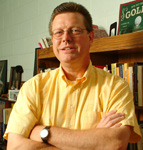|
|

|
Intersect: 'tis not too late
INTERSECT (Where the Bible Meets Life) is a regular column of ONE Magazine featuring Dr. Garnett Reid, a member of the Bible faculty at Free Will Baptist Bible College. Email Garnett greid@fwbbc.edu |
THE WORLD WOULD NEVER BE THE SAME. Acts 9 narrates what began as a typical day in first-century Syria. Yet on God’s calendar, He planned to shake the world that day. Saul of Tarsus, at the top of the church’s terrorist list, suddenly fell before Jesus and became a “victim” himself—not of the sword, but of the cross. He was a new man living in a new world.
Paul’s experience reminds us that as we unwrap God’s gift of every new day, He continually makes us into new people with new lives. Consider how He arranges these new possibilities for us.
New opportunities bump into us every day.
All the time, new opportunities mingle with us, begging to say hello. Ah, but they usually wear masks, you see. They use that slippery alias “potential” and like to hide as interruptions, duties, common tasks, and well-worn ruts. These “ruts,” though, may turn out to be clear paths that lead around a different corner to a new place.
Sometimes they’re bold, these opportunities, and they slap us in the face in their guise as illnesses, family crises, or job changes. I’m sure Paul saw Damascus as “just another gig” on his persecution tour. But God ended this tour early and booked a better one for him.
New opportunities require a teachable spirit.
This eminent rabbi, Gamaliel’s “A” student, had to re-enroll with a different teacher. Paul had to learn a new curriculum! In the coming days and weeks he sat at the feet of Ananias, Peter, James, and the Lord Himself. When we think there is nothing new we can learn, we’re right. School’s over and we’ve dropped out.
New opportunities threaten our comfort zone.
Paul faced challenges he’d never dreamed of—threats against his life, suspicion and resentment, and a total makeover of his thinking. Yet that’s what new challenges do: they “extrude” us, as Francis Schaeffer loved to say. They press, pull, bend, and stretch us, like working out a muscle we don’t normally use. The muscle hurts, for a while at least, until it learns those new moves.
New opportunities usually grow from what we’ve already tested and proven.
Though Paul shared a message of “good news,” the new covenant he preached blossomed from the bud of the old covenant he had studied all his life. Read his sermon at Antioch in Acts 13 and you will find that Paul integrated old and new, saying exactly what Moses said: Christ would suffer, rise from the dead, and bring light to the nations (Acts 26:22-23).
I remember crossing the Harpeth River in Tennessee over a new bridge built on 150-year-old foundations. Those “foundations” of faith anchored in Christ and His gospel will serve us well as our churches chart new directions and strategies for growth. They empower us to break out of stagnant, unholy routines that impede God’s work in our lives. We can and must change the way we think even as we take every thought captive to obey Christ.
Tennyson was right: “’tis not too late to seek a newer world.”
|
|

